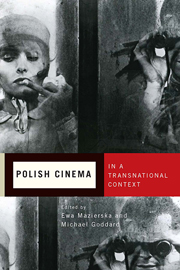Book contents
- Frontmatter
- Contents
- Acknowledgments
- Introduction: Polish Cinema beyond Polish Borders
- Part One The International Reception of Polish Films
- Part Two Polish International Coproductions and Presence in Foreign Films
- 6 Postcolonial Heterotopias: A Paracinematic Reading of Marek Piestrak's Estonian Coproductions
- 7 Poland-Russia: Coproductions, Collaborations, Exchanges
- 8 Train to Hollywood: Polish Actresses in Foreign Films
- 9 Polish Performance in French Space: Jerzy Radziwiłowicz as a Transnational Actor
- 10 Polish Actor-Directors Playing Russians: Skolimowski and Stuhr
- Part Three Émigré and Subversive Polish Directors
- Selected Bibliography
- List of Contributors
- Index
10 - Polish Actor-Directors Playing Russians: Skolimowski and Stuhr
from Part Two - Polish International Coproductions and Presence in Foreign Films
Published online by Cambridge University Press: 05 April 2014
- Frontmatter
- Contents
- Acknowledgments
- Introduction: Polish Cinema beyond Polish Borders
- Part One The International Reception of Polish Films
- Part Two Polish International Coproductions and Presence in Foreign Films
- 6 Postcolonial Heterotopias: A Paracinematic Reading of Marek Piestrak's Estonian Coproductions
- 7 Poland-Russia: Coproductions, Collaborations, Exchanges
- 8 Train to Hollywood: Polish Actresses in Foreign Films
- 9 Polish Performance in French Space: Jerzy Radziwiłowicz as a Transnational Actor
- 10 Polish Actor-Directors Playing Russians: Skolimowski and Stuhr
- Part Three Émigré and Subversive Polish Directors
- Selected Bibliography
- List of Contributors
- Index
Summary
The principle question of this chapter is: What messages are conveyed when Polish actors play Russian characters? The context of my ananlysis is the strained relationship between Poland and Russia that resulted from a centuries-long colonial relationship between these two countries, and was represented during the postwar period of People's Poland in official discourses as friendship. While the partitions period was arguably quite different from what is usually understood as colonialism, the postwar period is seen as semicolonial, as the Soviet Union dominated Poland by both political and military power.
I will discuss Polish actors playing Russian characters via two case studies: Jerzy Skolimowski in David Cronenberg's Eastern Promises (2007) and Jerzy Stuhr in Roman Kachanov's Ar'e (2008). These films provide an interesting comparison, because the former, an American/ Canadian production, offers an “external” perception of Russians and Russianness, while the latter is a Russian film. Furthermore, the two actors playing Russians are also very different. Skolimowski is predominantly known as a film director, although he also played roles in his own films. Stuhr was first an actor, who moved to directing in his middle age, largely influenced by his mentor, Krzysztof Kieślowski.
Transnational Actors and Actresses
While transnational directors have been given considerable space in academic writings, little attention has been granted to actors' cross-cultural journeys, and practically nothing to Eastern European actors playing in foreign films. Therefore, to seek conceptual tools to discuss the cases of Skolimowski and Stuhr, I turn to the recent studies concerning actresses from Southeast Asia playing in foreign films.
- Type
- Chapter
- Information
- Polish Cinema in a Transnational Context , pp. 194 - 212Publisher: Boydell & BrewerPrint publication year: 2014



